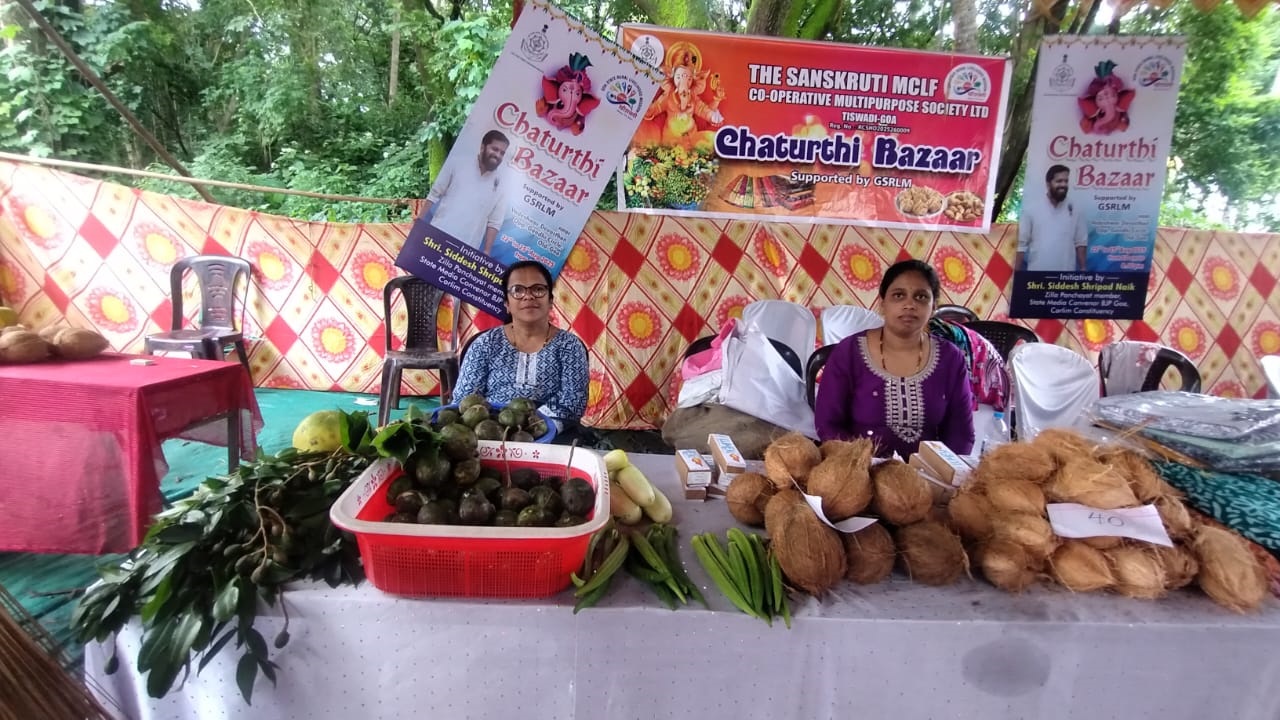
PANAJI
The lord of wisdom, Ganesh, will soon be welcomed into Goan homes, and devotees are preparing to receive their favourite deity with great enthusiasm. Chaturthi bazaars have already begun in different towns, with markets overflowing with flowers, fruits, vegetables, ghumots, makhars, matoli, sweets, clothes, firecrackers, decorative items, disco lights, and even readymade dhotis and sarees for those who cannot drape them.
Tripur Laxman Chodankar has been selling thermacol makhars for 18 years. He sets up shop in the Ponda Municipality Bazaar building, which he says has remained empty since it was built. “This has been my 19th year of setting Makhar Mela. I bring readymade Makhars from Mumbai since 2007. This time I have brought 50 pieces, otherwise I sell 100-150 per Chaturthi season. But after Covid pandemic people started making their own Makhars and my sales have dropped. My Makhars cost Rs 3,000 to 6,000 each, depending on the size,” says Tripur, who pays Rs 500 a day as rent for the stall.
Rudresh Verlekar puts up a temporary stall selling firecrackers and colourful paper decorations from Astami to Anant Chaturdashi. Business is never short, he admits. Flowers remain in high demand. Shevanti is selling at Rs 300 per kg, and marigold at Rs 160. A small portion of fragrant Mardol Jayo costs Rs 60 in Ponda, while the same is Rs 50 in Panaji. “We have artificial marigold floral torans for Rs 120 per metre,” said Puja, a shopkeeper at Ponda Varcha Bazaar, who usually sells jewellery and cosmetics but stocks torans for the Chaturthi season. One vendor is offering hanging plastic fruit clusters — bananas, pears, apples, oranges, and guavas — at Rs 150 for eight fruits. “This is not from China. It’s made in India,” he explained, adding that they are light and last all nine or eleven days of Sarvajanik Ganeshotsava without rotting.
At the same bazaar, Nagesh Ghotgalkar, who comes every year from Ram Nagar, is selling ghumots made from goat skin. “I bring 200 to 300 Ghumats of different sizes, and almost all get sold, except 10-12. The price starts at Rs 200 for small one and can go up to Rs 900 to 1000 for the largest one,” he shares.
Nearby, Prema Namdev Kumbhar, from a family of clay artisans, also has ghumots on sale. “We are clay artisans, and our family has been into this profession for generations. Apart from Ghumats we also make dhupdaani, matkas and other clay items,” she said.
From Dharwad, Samba Belgaonkar brings raw guavas and chickoos with leaves for matoli. He sells five pieces for Rs 50 but not singles, as he is in a hurry to return home. “I must sell all of these and return to my town, because I am fasting and don’t eat anything in Goa. I am sure all will be sold out by evening, as is my experience of the past five years,” he said. Sangita Naik is selling matoli items Ghagryo and Kangla for Rs 40 and Rs 25. “I can’t lower the prices as these are not available in the jungles now. We have to go deeper to find them,” she said.
Meanwhile, Taef Khan has ordered a full carrier of raw areca nut clusters from Maharashtra. Each cluster is priced between Rs 500 and Rs 800, depending on size. “I will be selling all of these and make a profit of Rs 50,000,” he happily shares.
From Usgao, Diksha Datta Kumbhar is selling rangolis at Rs 10 per packet. She sets up shop during Chaturthi and other festivals like Navratri and Diwali, and the rest of the year sells from home.
At Old Goa’s Gandhi Circle, about 25 women vendors are selling festive goods near Vadeshwar Devasthan. This initiative, led by Siddhesh Shripad Naik with support from the Goa State Rural Livelihood Mission, has given these women a platform to sell for the first time. Their stalls feature homemade snacks, woollen crochet items, torans, jewellery, incense, candles, fruits, groceries, clothes, purses and coconuts priced at Rs 40 to 60.
“We are members of Sanskruti Model Cluster Level Federation living at different places including Divar, Chorao, Dhulapi, Kumbharjuve, Corlim, Old Goa, Tiswadi etc. Some of us have put up stalls at Panaji too,” says Manaswi Gaude. Shweta Dalvi, Divya Usapkar, Shalan Tari and others say they have been part of the Chaturthi bazaar for three to four years, but this is the first time they have received sponsored space from a local BJP leader.
The Sanskruti MCLF brings together 12 village organisations, each with 15 self-help groups, adding up to around 10,000 women. These women make products at home and sell them at exhibitions and pop-up bazaars. The Old Goa bazaar was inaugurated on Saturday and will run till August 25, with more women expected to join with matoli items.